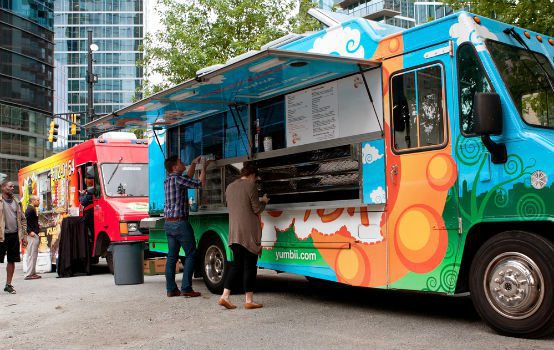Big Government Takes a Bite Out of Food Trucks

What do suspected criminals and food truck operators have in common? The answer to that question should be pretty straightforward: nothing. However, that hasn’t stopped lawmakers in Chicago from mandating surveillance of the Windy City’s wheeled restauranteurs, the same way they would for potential terrorists, burglars, and murderers.
Since 2012, Chicago has required food truck owners to equip their vehicles with GPS devices and provide location data to the government every five minutes. Businesses are also required to turn over location information to absolutely anyone who asks for it. This foolish rule could deprive Chicagoans of tasty culinary treats, since it adds an unnecessary burden on the city’s entrepreneurs. Thankfully, earlier this year, the Illinois Supreme Court agreed to hear a case that challenges many of Chicago’s costly food truck rules, including the GPS requirement. That means more freedom for food truck owners could be on the way.
Lauren and Kathryn Pekarik, sisters and co-founders of the Cupcakes for Courage food truck, argue the city’s GPS ordinance violates privacy protections enshrined in the Illinois Constitution. But as Timothy Snowball of the Pacific Legal Foundation argues, this law violates more than just state law—it infringes on the Fourth Amendment of the United States Constitution.
“No matter how hard Mayor Emanuel tries to convince us otherwise, there is no ‘culinary convenience’ exception to the Fourth Amendment,” Snowball wrote in an op-ed at The Hill.
He’s right. Over the years, the Supreme Court has carved out a few major exceptions to the Fourth Amendment. It has allowed law enforcement to negate warrant requirements before conducting searches in various circumstances, such as emergencies and when a suspect is able to flee if police leave the scene to obtain a warrant. One of these exceptions helps form the basis for allowing this surveillance—the “automobile exception” to the Fourth Amendment. However, the rationale for the automobile exception, as laid out in the Supreme Court case Carroll v. United States, is that law enforcement shouldn’t be required to obtain a warrant to search a vehicle when there is valid suspicion that the vehicle has something criminal inside. This clearly isn’t applicable to food trucks, unless police had a legitimate reason to believe the truck was being used for, say, drug production. And food trucks are much more than mere automobiles—they’re businesses.
So if the Supreme Court’s exceptions to the Fourth Amendment don’t justify Chicago’s monitoring of food trucks, where else do city lawmakers find a rationale for such a policy? After all, the original bill passed the City Council 45-1 in 2012.
Democratic Mayor Rahm Emanuel was concerned that food trucks would harm Chicago’s restaurant business. The city uses information gathered from its GPS surveillance to enforce a “200-foot” rule, which, as its name suggests, states that no food truck can be parked within 200 feet of a “brick-and-mortar” food establishment. The fine for parking in such an area is $2,000—more than 10 times higher than the fee for parking in front of a fire hydrant. This amounts to government picking winners and losers by squashing blossoming start-ups and favoring established businesses.
As John Arena, the Chicago City alderman and lone “no” vote against the food truck regulations, deftly described it: “The brick and mortar restaurant lobby got ahold of [the plan] and it was stuffed with protectionism and baked in the oven of paranoia.”
It shouldn’t surprise anyone that lawmakers in Chicago are using such an absurd regulation to bully citizens. After all, city officials have used other surveillance methods to extort money in the past. Take the city’s red light camera program, for example. In 2014, Chicago officials reportedly tampered with the cameras to shorten the time that yellow lights were active. As a result, city drivers were saddled with 77,000 tickets in that year alone. It was a move that took an additional $8 million out of driver’s pockets.
Chicago’s GPS surveillance of food trucks is merely the latest ridiculous example of cronyism meeting government surveillance. Even beyond its violation of the Fourth Amendment, it creates a barrier to entry for those who have dreams of running their own food trucks. The city should leave culinary visionaries, like the Pekarik sisters and others, free to cook their food in a truck—without government’s obnoxious meddling.
Dan King is a Young Voices Contributor, journalist, and digital communications professional based in Arlington, Virginia. His work has appeared at Reason, The American Conservative, The Week and the Washington Examiner.
Comments